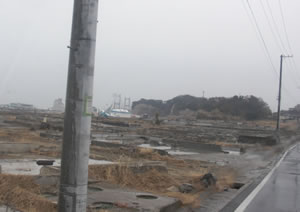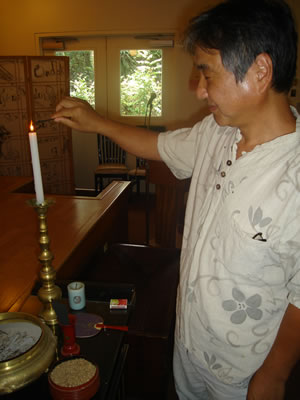A Radiation Respite For Tsunami Kids

Noriaki Fujimori shot this photo in a tsunami-devastated area of Japan earlier this year. Photo courtesy Noriaki Fujimori
Noriaki Fujimori is concerned about the health effects of radiation on Japanese children. The Waimea Higashi Hongwanji Buddhist Temple minister wants to help by bringing keiki living in areas affected by last year’s tsunami to Kaua’i during their school breaks.
“If the children come to Kaua’i, they will be much better. It’s a big help,” he says.
Providing an opportunity for the keiki to visit our island for a week or more is a way for them to reduce their exposure to nuclear power plant radiation. It would allow them to breathe fresh air, drink clean water and consume uncontaminated food.
“Apparently, that is one way to combat the radiation poisoning, and even a few weeks in a clean environment can make a difference,” says County Councilwoman JoAnn Yukimura, who is supportive of Fujimori’s efforts.
Though she is still conducting research on the health benefits, Yukimura says it would be a way for Kaua’i to extend aloha to others.
Originally from Japan, Fujimori moved here the same year Hurricane ‘Iniki ravaged the Garden Isle nearly two decades ago. Having lived through it, he understands what it’s like to experience devastation, and he empathizes with others who are similarly affected.
“It would be fitting to commemorate that life-changing disaster in our history by reaching out to others who have more recently experienced a disaster and are still going through the aftermath,” says Yukimura.
Though it was a natural disaster, witnessing people help one another after ‘Iniki was a positive experience for Fujimori.“Maybe the community will want to help again and share the experience with them,” he says.
Fujimori has visited the area of Japan hit by the 2011 tsunami and already has plans to return.
“They are having a hard time and we can learn a lot about it,” he says.
Not only is the ocean’s aftermath still present, residents are no longer able to live within a 15-mile radius of the Fukushima nuclear power plant.
“People are trying to clean up, but the children are becoming affected with radiation,” he says.
Fujimori is working with victims and families to try to help as many children as possible “breathe and pray deeply here.”
A message most strongly conveyed to Fujimori by the people of Japan is to encourage others worldwide not to implement nuclear power.
“One of the ladies said, ‘Please tell the American people I don’t want nuclear plants anymore in the world,'” he says.
Respecting nature is important, and it was a lesson Fujimori learned during the hurricane.
“The nuclear plant does-n’t respect nature,” he says.
Everything from food to people’s homes are now exposed to harmful levels of radiation in parts of Japan. Some of Fujimori’s friends who subsisted from their own gardens have had to move to find work in Tokyo. He hopes to help alleviate some of their familial troubles.
Currently, he is attempting to establish a planning committee that will help accomplish his goal. He estimates it would cost around $1,000 for each child to be brought to the island.
“Kaua’i has experience in hosting foreign students in many different contexts, and this would be another context to work on,” says Yukimura.
“We always benefit from people-to-people encounters that allow sharing and helping of each other (witness the recent Tropic Care outreach that touched both the visiting medical teams and our island people). For our keiki to learn firsthand about hardships and issues from other parts of the world will be both an educational and humanitarian experience for them.”
For more information or to help, contact Fujimori at 645-0237 or email fujimori@hawaii.rr.com. coco@midweekkauai.com




